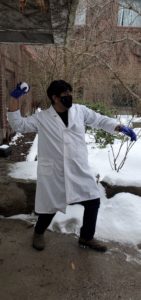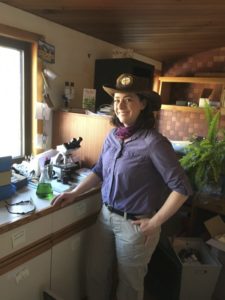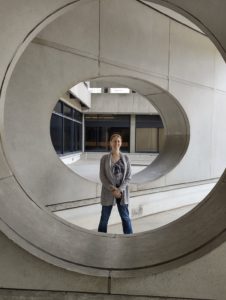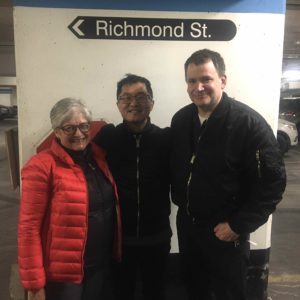I had not updated this page since 2016, mainly due to it being a low priority in light of the impact of a back injury on my research time. In the intervening five years, many students and colleagues have visited my lab to do research. To get some idea about the wonderful folk with whom I've collaborated on research or students whom I supervised, I point you to my blog, where I often posted about our work together.
2021-22 Current Graduate Students
Aman Basu, PhD Candidate (in his own words)
 The overall theme of my PhD research is to understand the many ways in which human societies and ecological systems are connected, how they influence each other and to explore how resilience can be built into these social-ecological systems.
The overall theme of my PhD research is to understand the many ways in which human societies and ecological systems are connected, how they influence each other and to explore how resilience can be built into these social-ecological systems.
I am exploring these questions and their related hypothesis through a case study approach, including looking at:
- How lake ice cover is changing across the Northern Hemisphere (with Professor Sapna Sharma’s lab).
- The impact of anthropogenic stressors on the water quality of the Great Lakes (also with Professor Sapna Sharma’s lab).
- How human-generated impacts on local and global nitrogen cycles are affecting the establishment and spread of invasive plant species.
In addition to the case study research listed above, I am also a member of the NSERC-CREATE student training program, TABES – Training in Applied Biotechnology for Environmental Sustainability.
I grew up in an alternative schooling environment, which helped me to imagine pursuing studies in different STEM disciplines. I feel that interdisciplinary experiences are pivotal for scholarly research that aims to find solutions and options for understanding wicked problems like climate change.
My academic background includes a B.Sc. in physics, and a course-based M.Sc. in environmental science. The diverse scholarly approaches that I have learned, have helped me to frame my big-picture research questions since I joined the Bazely lab in September 2020. In addition, after I finished my master’s, I worked as a research fellow in a bioenergy project led by the University of Leeds, UK.
My peer-reviewed publications span social sciences, ecological economics, renewable energy, health risk assessments, and fast fashion. I enjoy collaborating and working in research teams. See my works on google scholar for further information.
When I am not thinking about R-code and conceptual ecological models, I am often to be found pursuing my other interests, including painting, designing for publications, singing Bengali folk songs, and playing Indian classical music on the instrument known as the Esraj. Now that it’s possible to move around more easily, I am exploring Toronto, and Ontario.
Jenna Leblanc, PhD Candidate (in her own words)
 My doctoral research examines the ecology of systemic fungal endophytes of Festuca hallii and F. campestris, two long-lived, foundational species of indigenous rough fescue grass species, and the role that endophytes may play in the ecological restoration of rough fescue grasslands in Alberta.
My doctoral research examines the ecology of systemic fungal endophytes of Festuca hallii and F. campestris, two long-lived, foundational species of indigenous rough fescue grass species, and the role that endophytes may play in the ecological restoration of rough fescue grasslands in Alberta.
I joined the Bazely Lab in 2019 after completing a Masters of Environmental Science at the University of Toronto, and a Bachelor of Science in Biology at St. Mary’s University in Calgary, Alberta.
I am a keen naturalist, and at heart, a prairie girl, with a long-term interest in the restoration ecology of threatened native fescue grasslands in Alberta. However, my 2020 field season was cancelled due to the Covid-19 pandemic, so I pivoted to an in-depth autecological study of the grasslands’ foundational species, Rough fescue (Festuca hallii and Festuca campestris).
This pivot, and the novel discoveries it generated, were documented my People’s Choice award-winning talk, Making lemons from lemonade: PhD research in a pandemic, presented at the 46th Annual YorkU AGSBS Biology Symposium which was postponed to August 2020. The talk will soon be posted on my Vimeo channel.
In 2021, I returned to the field, to study Rough fescue grasses in situ at Glenbow Ranch Provincial Park. Earlier this year, I spoke about my experiences as an invasive plant management practitioner in the Invasive Species Centre webinar series. My talk was titled: Weedbusters: The trials, tribulations, and toolbox of an invasive plant management practitioner.
My other interests include birdwatching, cooking, and pondering the ecosystem dynamics of the Hoenn Region while playing Pokémon: Alpha Sapphire.
News: Jenna received the Faculty of Science Richard Jarrell Excellence in Teaching Award at the Graduate Level for 2021
Nyssa van Vierssen Trip, PhD Candidate (in her own words)
 I am a doctoral candidate in the Faculty of Environment and Urban Change (EUC). My PhD focuses on understanding peoples’ connection to nature. To do this, I use different techniques from the sciences (statistical analysis) and humanities (text analysis).
I am a doctoral candidate in the Faculty of Environment and Urban Change (EUC). My PhD focuses on understanding peoples’ connection to nature. To do this, I use different techniques from the sciences (statistical analysis) and humanities (text analysis).
In 2020, I published a paper in Conservation Science and Practice with collaborators, Professor Sheila Colla (York University), Dr. Victoria MacPhail (York University) and Ms. Beatrice Olivastri (Friends of the Earth, Canada). We found that Canadians are highly engaged in native pollinator conservation and want the federal and provincial governments to take the lead in conservation efforts.
I am currently exploring how environmental policy evolves, by looking at how global environmental advocacy organizations discuss nature conservation from different biological, economic and social angles. I am also interested in understanding how people engage with social media to talk about their local city park.
Before starting on my interdisciplinary path at York University, I began my academic career in biology. I hold a bachelor’s degree in Biology from Carleton University (Ottawa) and a master’s degree in Biology from Memorial University (St. John’s).
Since joining York University as a doctoral student in 2015, I have had a chance to gain experience as a course director. In 2017, I taught a third-year Faculty of Environmental Studies course in Landscape Ecology. I have worked as a Teaching Assistant (TA) in home faculty EUC and the faculty of science, Biology and Natural Sciences.
Dawn was originally a member of my supervisory committee, and sometime Acting Supervisor during sabbatical and leaves, and in 2021 took on the role of my PhD Supervisor.
- Twitter: @TripNyssa
- Google Scholar: https://scholar.google.com/citations?user=meuvmtQAAAAJ&hl=en
2016 to 2021 -- check out my blog posts to learn about grad students and colleagues visiting the lab
2015-2016 Academic Year
Dr. Mark Vicari does research on fungal endophytes of grasses

At the Rise of Skywalker in 2019 my first two graduate students, Dr. Saewan Koh (centre) and Dr. Mark Vicari (right)
Mark Vicari (right) did his B.Sc. at Trent University, his M.Sc. at York University, graduating in 1993, and his Ph.D. at Lancaster University in the United Kingdom. His M.Sc. thesis received York University's award for the best Master's thesis of the year. In 1993 Mark won a Commonwealth Scholarship for his Ph.D. work.
Mark is a CUPE contract faculty instructor at York University, and he teaches a variety of undergraduate courses. He has been nominated for the TV Ontario Best Lecturer of the Year award.
Mark received a CUPE 3903 Research Award in 2014.
Update: In 2020, Mark joined the faculty in the Biology Department as a Tenure Track professor in the Teaching Stream!
What doesn't kill you makes you stronger?
A back injury in April 2015 scuppered my planned summer field work, since I was unable to drive (or sit). Since September 2015, I have been slowly returning to research, picking up all of the projects that I had to drop.
In addition to my colleague, Dr. Mark Vicari, Chris Torikoglu, Mishal Khan and Dhaivat Pancholi joined the lab for honours research theses and research practicums.

